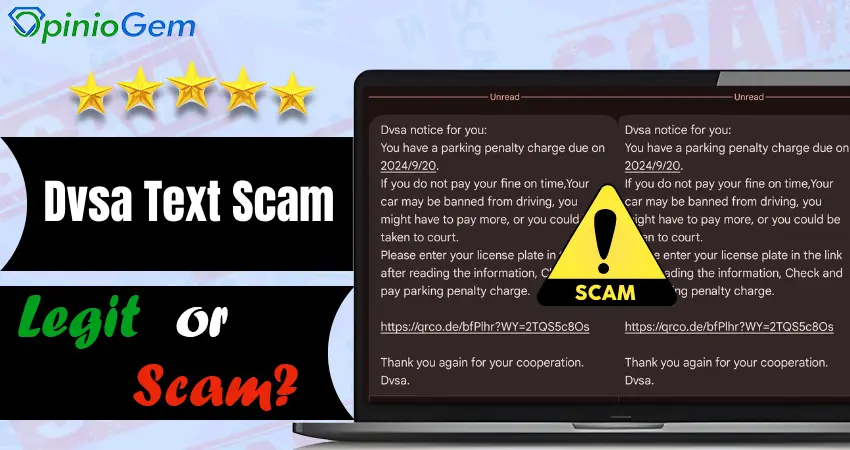DVSA text scam is one of the latest ways they’re trying to fool people. If you’ve received a text from the DVSA (Driver and Vehicle Standards Agency) asking you to pay a parking fine, be careful. The message is a scam meant to scare you into clicking bad links that can steal your personal and financial details. In this article, we’ll explain how the DVSA text scam works, what warning signs to look for, and what to do if you’ve received this fake message.
What is the DVSA Text Scam?
The DVSA text scam is a type of phishing where scammers send fake text messages pretending to be from the DVSA, a real UK government agency that deals with driving and vehicle rules.
The message usually says you owe money for a parking fine and threatens things like banning your car from driving or adding extra fees if you don’t pay right away.
The scammers include a link that takes you to a fake website where they try to steal your information.
This scam is dangerous because it uses fear to make people act quickly.
The message looks real because it sounds official and might even have fake government logos.
But the truth is, the DVSA doesn’t give out fines, and any real parking fines would come from your local council, not in a text message.

What Does the Scam Text Message Say?
Here’s an example of what the scam message might say:
“DVSA notice: You have a parking fine due on 2024/9/20. If you don’t pay, your car could be banned, you may have to pay more, or you could go to court. Enter your license plate in the link to check and pay the fine.”
The message usually has grammar mistakes and uses “license plate,” which is an American term.
In the UK, they say “vehicle registration number.” These small mistakes are clues that it’s a scam.

Our Opinion
We believe the DVSA text scam is an obvious attempt to scare people into giving up personal info.
The scammers want to make you feel like you’re in trouble, but there are some clear signs that show it’s fake.
First, the DVSA doesn’t deal with parking fines—that’s handled by your local council or private parking companies.
Real government groups also wouldn’t ask for your sensitive information in a text or link to a suspicious website.
Also, watch out for strange web links. Real government websites will always end in “.gov.uk” or something similar.
If you get a message like this, stay calm, don’t click anything, and check the information using official sources.
What to Do If You Receive This Message
If you get a scam message like this, follow these steps to protect yourself:
- Don’t click any links: The links are meant to steal your info or put bad software on your phone. Avoid them.
- Delete the message: Once you’re sure you haven’t clicked anything, delete the message from your phone.
- Report the scam: In the UK, you can report the scam by forwarding the message to 7726, a free service to report scams.
- Check with official sources: If you’re unsure if the fine is real, contact the DVSA or your local council using their official websites or phone numbers.
- Scan your device: If you accidentally clicked the link, run a virus check on your phone and consider resetting it to remove any harmful software.
By following these steps, you can protect yourself from the DVSA text scam and keep your information safe.
If you received an email from Hurrain Ecommerce Ventures saying you’ve been picked for a $88,000 job.



[…] we’ll explain how the DVSA text scam works, what warning signs to look for, and what to do if you’ve received this fake … […]
[…] you received a suspicious text about a parking fine from the DVSA? You’re not alone! Don’t fall victim! Check out our review on how to identify and avoid this […]
[…] you received a suspicious text about a parking fine from the DVSA? Have you received a suspicious text about a parking fine from the DVSA?. Don’t fall victim! Check out our review on how to identify and avoid this […]
[…] you received a suspicious text about a parking fine from the DVSA? You’re not alone! Don’t fall victim! Check out our review on how to identify and avoid this […]